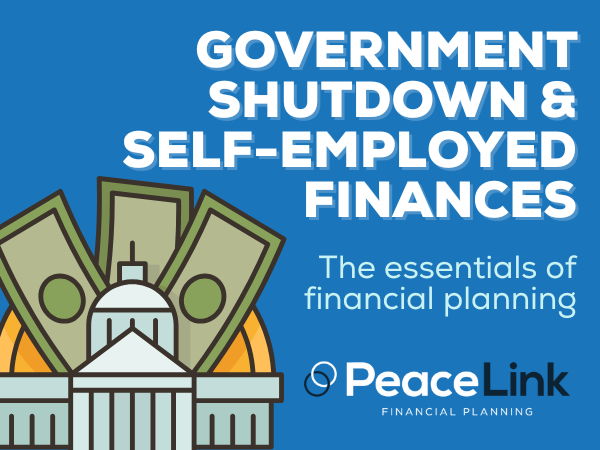
Share this Post
Government Shutdown and Self-Employed Finances
Every time a government shutdown makes headlines, it’s more than just political noise; it’s a financial wake-up call. Federal workers miss paychecks. Agencies freeze payments. And of course, the IRS keeps collecting taxes, regardless.
For most W-2 employees, it’s stressful. But for commission-based professionals, the parallels are striking. Income is often inconsistent, cash flow is unpredictable, and without a proactive plan, one slowdown can create a feeling of chaos.
That’s why financial planning is essential. Here’s what a government shutdown can teach real estate agents and small business owners about preparing their business finances for inevitable uncertainty.
1. Realtors Need an Emergency Fund for Variable Income
During a shutdown, federal employees with no savings feel the pinch immediately. And realtors know the feeling of financial draught all too well: deals fall through, listings stall, and closings can be delayed for months.
Without a safety net, your household budget is at the mercy of the housing market.
Action Step: Aim for a 3–6 month emergency fund—both personally and in your business. A dual safety net ensures that one slow quarter doesn’t derail your entire plan.
2. Cash Flow Planning Prevents Lifestyle Whiplash
A government shutdown delays payments to contractors and agencies. For realtors, income swings from big commission checks to dry spells can have the same effect. Too often, we see realtors spend the $40,000 commission check as if the next one is guaranteed. When it doesn’t come, bills pile up and stress sets in.
Action Step: Treat your real estate business like a business. Pay yourself a consistent “salary” out of your business account each month. This smooths out the highs and lows and keeps your personal spending predictable.
3. Tax Planning Can’t Wait
Shutdown or not, the IRS never stops. Quarterly estimates, payroll taxes, and year-end filings remain due, even if the government itself is closed.
This is a hard truth: your tax liability doesn’t pause when your closings do.
Action Step: Build tax planning into your cash flow system. Set aside 25–30% of every commission check for taxes. Better yet, work with a planner who integrates bookkeeping, payroll, and tax prep so your financial and tax strategies actually work together.
4. Diversification Builds Financial Security
A government shutdown exposes the danger of relying on a single source of income. Realtors face the same risk when they depend solely on sales commissions.
Action Step: Create multiple income streams:
- Contribute to a Solo 401(k) for retirement savings
- Open a taxable brokerage account for passive growth
- Consider rental income (but only if it fits into a broader plan)
- Keep retained earnings in your real estate business instead of draining every dollar
Diversification protects you when closings slow down or the market shifts.
5. Financial Planning = Peace of Mind
At its core, a government shutdown is a stress test. For realtors, every deal delay or market slowdown is its own version of that test. The difference between stress and stability often comes down to one thing: planning.
A customized plan helps you:
- Manage inconsistent cash flow
- Reduce taxes legally and strategically
- Build wealth outside of commissions
- Create financial independence, regardless of market conditions
- Minimize financial stress and build a life you love
Final Thoughts
You can’t control Washington, mortgage rates, or the economy. But you can control your financial preparedness. That’s the heart of what we do—turning unpredictable income into a stable, scalable future.
At PeaceLink Financial Planning, we specialize in helping top-producing realtors and business owners integrate tax planning, cash flow systems, and wealth-building strategies under one roof.
Because financial success isn’t just about the size of your last commission check. It’s also about whether your plan works when the next one doesn’t come.
Call to Action: Ready to stop living commission-to-commission and start building long-term wealth? Let’s talk about a strategy designed specifically for your unique situation.
